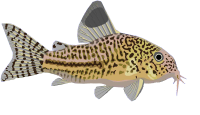Bristlenoses old enough to breed?
- Ben
- Posts: 191
- Joined: 06 Jan 2003, 10:47
- Location 1: PEI, Canada
- Interests: Fish, Computers, Comic Books, Nature
- Contact:
Bristlenoses old enough to breed?
My bristlnoses have been developing nicely over the past few months. They were rather young when I got them, and it's been a thrill to watch the brisltes and colouration develope over time. My male is now about 2.5 inches, and has some nice bristles develping, but still has a way to go before he's at "full bloom". My famle is a good bit smaller at about 1.75 inches, and just the slightes row of bristles running the rim of her nose.
Recently I dug out my 10 gallon tank to potentially use as a breeding tank. It's now fully cycled, contains a nice piece of bog wood, some live plants, and a 1.5 inch pice of PVC tubing (8 inches long) with gravel siliconed to the outside to blend in.
I suppose my question is, normally with these lovely fellows, how large, or how developped do they normally get before are able to breed? I am guessing mine still have a good few months to go, but am curious as to when I should try putting them into the breeding tank. Have kept plecs and other cats for some time, but this is my first attempt to breed them.
Thanks!
Ben
Recently I dug out my 10 gallon tank to potentially use as a breeding tank. It's now fully cycled, contains a nice piece of bog wood, some live plants, and a 1.5 inch pice of PVC tubing (8 inches long) with gravel siliconed to the outside to blend in.
I suppose my question is, normally with these lovely fellows, how large, or how developped do they normally get before are able to breed? I am guessing mine still have a good few months to go, but am curious as to when I should try putting them into the breeding tank. Have kept plecs and other cats for some time, but this is my first attempt to breed them.
Thanks!
Ben
- Yann
- Posts: 3617
- Joined: 30 Dec 2002, 20:56
- I've donated: $20.00!
- My articles: 8
- My images: 275
- My cats species list: 81 (i:0, k:0)
- My BLogs: 2 (i:3, p:81)
- Spotted: 109
- Location 1: Switzerland
- Location 2: Switzerland
- Interests: Catfish mainly form South America, Cichlids, Geckos, Horses WWII airplanes, Orchids
Hi!
Well according to me, I'll say that they are still young, I would not expect them to breed before reaching a size of at least 3 inches, and with 4 inches be most likely!
Still I found it strange to see a female developping here tentacules at that early stage, could well turn out to be a male.
When female grow tentacles, these usually start to grow at a rather older age and bigger size!
Cheers
Yann
Well according to me, I'll say that they are still young, I would not expect them to breed before reaching a size of at least 3 inches, and with 4 inches be most likely!
Still I found it strange to see a female developping here tentacules at that early stage, could well turn out to be a male.
When female grow tentacles, these usually start to grow at a rather older age and bigger size!
Cheers
Yann
Don't Give Up, Don't Ever Give Up!
- Ben
- Posts: 191
- Joined: 06 Jan 2003, 10:47
- Location 1: PEI, Canada
- Interests: Fish, Computers, Comic Books, Nature
- Contact:
Thanks for the reply Yann,
With the "female", I wouldn't so much call what she has tenticles, more like tiny bumps. You can only see them if you look really closely while she is staying still. This pic is about 2 or 3 weeks old now, and shows the front of her face nicely. She hasn't shown any sign of developing in this respect since, where with the male, I swear I can see more tenticle developement every day That's what I get for spending endless hours staring at my fish
That's what I get for spending endless hours staring at my fish 

With the "female", I wouldn't so much call what she has tenticles, more like tiny bumps. You can only see them if you look really closely while she is staying still. This pic is about 2 or 3 weeks old now, and shows the front of her face nicely. She hasn't shown any sign of developing in this respect since, where with the male, I swear I can see more tenticle developement every day

- Yann
- Posts: 3617
- Joined: 30 Dec 2002, 20:56
- I've donated: $20.00!
- My articles: 8
- My images: 275
- My cats species list: 81 (i:0, k:0)
- My BLogs: 2 (i:3, p:81)
- Spotted: 109
- Location 1: Switzerland
- Location 2: Switzerland
- Interests: Catfish mainly form South America, Cichlids, Geckos, Horses WWII airplanes, Orchids
Hi!
The reason why the other one is not growing to fast, can be easily answer, one is the dominant and the other the submissive.
As long as the submissive does not show his real sex, he will avoid agresivity from the other.
Like I told you usually as such early age and size, if an Ancistrus show bristle, there are really good chance that it is a male!
Cheers
Yann
The reason why the other one is not growing to fast, can be easily answer, one is the dominant and the other the submissive.
As long as the submissive does not show his real sex, he will avoid agresivity from the other.
Like I told you usually as such early age and size, if an Ancistrus show bristle, there are really good chance that it is a male!
Cheers
Yann
Don't Give Up, Don't Ever Give Up!




